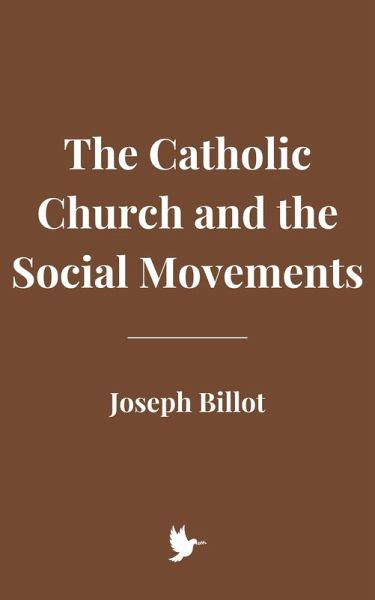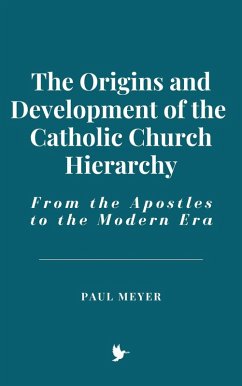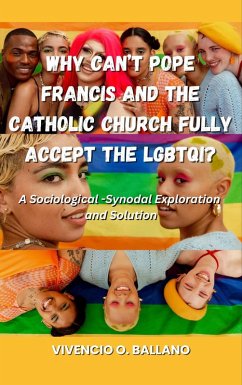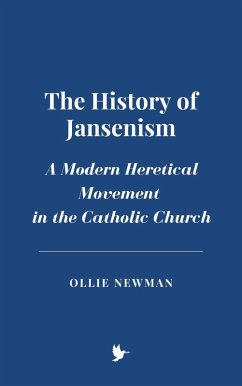
The Catholic Church and the Social Movements (eBook, ePUB)

PAYBACK Punkte
0 °P sammeln!
This book explores the complex and evolving relationship between the Catholic Church and various social movements throughout history. From the early Christian communities under Roman rule to the Church's engagement with the global challenges of the 21st century, the narrative highlights how the Church has been both a force for social transformation and a defender of tradition, navigating the tensions between spiritual ideals and the realities of a changing world.The book begins by examining the roots of the Church's social mission in the teachings of Jesus and the practices of the early Christ...
This book explores the complex and evolving relationship between the Catholic Church and various social movements throughout history. From the early Christian communities under Roman rule to the Church's engagement with the global challenges of the 21st century, the narrative highlights how the Church has been both a force for social transformation and a defender of tradition, navigating the tensions between spiritual ideals and the realities of a changing world.
The book begins by examining the roots of the Church's social mission in the teachings of Jesus and the practices of the early Christian communities, focusing on their care for the marginalized and their resistance to the social norms of the Roman Empire. As the Church grew in influence, it developed institutions such as monasticism that preserved cultural heritage and provided social stability in medieval Europe. During the Reformation and Counter-Reformation, the Church responded to theological and social upheavals, redefining its role amidst religious conflicts and the rise of new Christian traditions.
With the advent of the Industrial Revolution, the Church faced new social challenges, leading to the birth of modern Catholic Social Teaching. Key papal encyclicals such as Rerum Novarum and Quadragesimo Anno articulated the Church's vision for justice, workers' rights, and the role of economic systems in promoting the common good. The 20th century brought further developments as the Church engaged with issues like human rights, liberation theology, and global peace efforts during the Cold War.
The Second Vatican Council marked a significant turning point, with the Church embracing a more open dialogue with the modern world and reaffirming its commitment to human dignity and social justice. The teachings of Gaudium et Spes and subsequent papal encyclicals emphasized the Church's role in addressing the challenges of globalization, migration, and ecological crises. The pontificate of Pope Francis has continued this emphasis, with encyclicals like Laudato Si' and Fratelli Tutti addressing the moral dimensions of environmental stewardship, economic inequality, and the importance of global solidarity.
The book also explores the Church's engagement with social movements in the Global South, including the rise of Liberation Theology in Latin America, peace-building efforts in Africa, and the struggle for religious freedom in Asia. It examines the Church's role in international advocacy, including its participation in the United Nations and its efforts to promote peace, disarmament, and human rights on a global scale.
As the Church faces new ethical frontiers in the 21st century, such as the rise of artificial intelligence, biotechnology, and the digital revolution, this book considers how the principles of Catholic Social Teaching continue to offer a vision for a just and compassionate society. It highlights the Church's call to address contemporary challenges through a lens of human dignity, solidarity, and care for creation.
Ultimately, The History of Social Movements and the Catholic Church provides a comprehensive overview of the Church's evolving engagement with social issues, offering insights into how Catholic Social Teaching has shaped, and been shaped by, the struggles for justice throughout history. It is a story of continuity and change, of tradition and renewal, and of a community of believers committed to living out the Gospel's call to love, serve, and transform the world.
The book begins by examining the roots of the Church's social mission in the teachings of Jesus and the practices of the early Christian communities, focusing on their care for the marginalized and their resistance to the social norms of the Roman Empire. As the Church grew in influence, it developed institutions such as monasticism that preserved cultural heritage and provided social stability in medieval Europe. During the Reformation and Counter-Reformation, the Church responded to theological and social upheavals, redefining its role amidst religious conflicts and the rise of new Christian traditions.
With the advent of the Industrial Revolution, the Church faced new social challenges, leading to the birth of modern Catholic Social Teaching. Key papal encyclicals such as Rerum Novarum and Quadragesimo Anno articulated the Church's vision for justice, workers' rights, and the role of economic systems in promoting the common good. The 20th century brought further developments as the Church engaged with issues like human rights, liberation theology, and global peace efforts during the Cold War.
The Second Vatican Council marked a significant turning point, with the Church embracing a more open dialogue with the modern world and reaffirming its commitment to human dignity and social justice. The teachings of Gaudium et Spes and subsequent papal encyclicals emphasized the Church's role in addressing the challenges of globalization, migration, and ecological crises. The pontificate of Pope Francis has continued this emphasis, with encyclicals like Laudato Si' and Fratelli Tutti addressing the moral dimensions of environmental stewardship, economic inequality, and the importance of global solidarity.
The book also explores the Church's engagement with social movements in the Global South, including the rise of Liberation Theology in Latin America, peace-building efforts in Africa, and the struggle for religious freedom in Asia. It examines the Church's role in international advocacy, including its participation in the United Nations and its efforts to promote peace, disarmament, and human rights on a global scale.
As the Church faces new ethical frontiers in the 21st century, such as the rise of artificial intelligence, biotechnology, and the digital revolution, this book considers how the principles of Catholic Social Teaching continue to offer a vision for a just and compassionate society. It highlights the Church's call to address contemporary challenges through a lens of human dignity, solidarity, and care for creation.
Ultimately, The History of Social Movements and the Catholic Church provides a comprehensive overview of the Church's evolving engagement with social issues, offering insights into how Catholic Social Teaching has shaped, and been shaped by, the struggles for justice throughout history. It is a story of continuity and change, of tradition and renewal, and of a community of believers committed to living out the Gospel's call to love, serve, and transform the world.
Dieser Download kann aus rechtlichen Gründen nur mit Rechnungsadresse in A, B, CY, CZ, D, DK, EW, E, FIN, F, GR, H, IRL, I, LT, L, LR, M, NL, PL, P, R, S, SLO, SK ausgeliefert werden.













